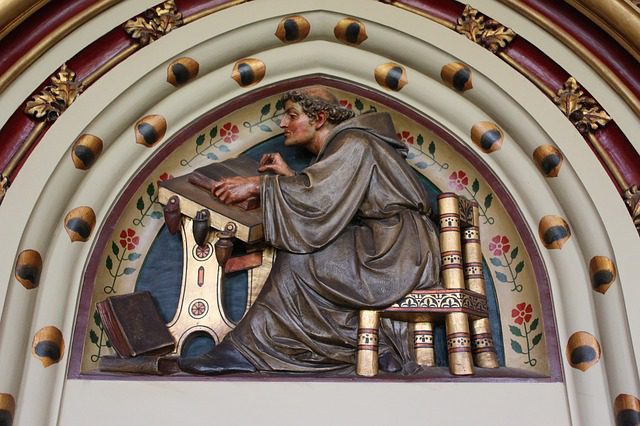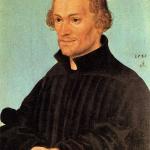
I only wished to show, by the way, what kind of monks the early Church had, and what the monastic profession then was, that from the contrast sound readers might judge how great the effrontery is of those who allege antiquity in support of present monkism. Augustine, while tracing out a holy and legitimate monasticism, . . . (Institutes of the Christian Religion, Book IV, 13:10)
Observe how Calvin described ancient monasticism as “holy and legitimate.” Why, then, doesn’t he advocate its continuance in his time, if it was such a holy, good thing? He roundly refutes his own point of view by (on the one hand) granting that the thing was once holy, and (on the other hand) denying any possibility of, therefore, reforming it and getting it back to the place where it once was.
He despairs; he lacks hope and faith that the Church can bring this about by God’s grace. It’s an essentially cynical, pessimistic outlook; most contrary to New Testament injunctions of idealistic optimism in the Holy Spirit. The early Protestants loved to call themselves “reformers” (and they are called that to this day), yet what they usually advocated was the furthest thing from “reform” — by any reasonable definition of the term.
Calvin rightly condemns the real sins of the monks and priests of his time, but the reader must remember the sleight-of-hand employed. A large part of what was the entire picture of the early Church “holy” monks were those “Catholic” practices which Calvin condemns. But Calvin seems unable or unwilling to note the striking self-contradiction.
If Calvin grants that the ancient monks were more holy (which was in all likelihood the case, in contrast to the corrupt, decadent period of the 16th century, with personal sin among priests and religious sadly rampant), then it is quite obvious that the answer to the current problem is to find a way to get the current clergy and religious reformed, so that they are like their ancient forebears, whom even Calvin admires and offers as a contrast. This was the solution of the Catholic Reformation later in the 16th century, with the Council of Trent and other reforms, but not of the Protestant Revolution.
The answer is clearly not to get rid of the categories of priest and nuns and monks altogether. If the categories are essentially wrong and wicked and unnecessary and unbiblical, etc., then they were just as wrong in the 4th and 5th centuries as they were in the 16th (from a Protestant revolutionary perspective). Therefore, Calvin couldn’t have reasoned by way of contrasting the older examples with the newer ones. But Calvin doesn’t reason that way. It would be too logically consistent for his taste. Rather, he argues in the following altogether ridiculous fashion:
1) The old priests and monks and nuns were holy and pious; good folk.
2) Today, the same classes are thoroughly corrupt.
3) Therefore, there is no hope, and we must abolish all three classes.
This doesn’t even get into the accompanying ludicrous notions of the Mass being blasphemous, abominable, idolatrous, and so forth; yet the very same Mass with the same beliefs, as celebrated by the ancients, somehow doesn’t make them culpable of the same wickedness that Calvin accuses Catholics in his time of committing every time they go to church. We see contradiction and unfathomable self-contradiction at every turn when closely examining Calvin’s and other Protestant originators’ worldviews.
What in the world is wrong with separation for the right reasons? One could have a ministry of prayer, which is a non-social thing in and of itself. John the Baptist separated himself. The prophets were usually isolated figures, by the nature of their function. Jesus went away to be by Himself during times of prayer. He fasted 40 days and nights by Himself before He began His public ministry. Again, we observe the rigid legalism and inability to allow different gifts to be exercised in the Church. It’s Calvin’s way or the highway.
I would say that the principles are eternal and grounded in Scripture and sacred tradition. What we need to reject is secularism, not monasticism. We need to be more like the Bible and the Church, than the world, which will never ever understand monasticism and the evangelical counsels. Even many Protestants (including John Calvin) don’t get it.
***
Related Reading:
Monasticism Defended from Scripture and Reason [1997]
Unbiblical Opposition to Priest’s Vows (vs. Calvin #32) [9-21-09]
Evangelical Counsels & Monasticism (vs. Calvin #33) [9-22-09]
Tonsure, Holy Oil, and “Judaizing”? (vs. Calvin #54) [12-22-09]
***
(originally 1-26-19 on Facebook)
Photo credit: [Max Pixel / CCO public domain]
***












